
Ambient music is a genre of music that emphasizes tone and atmosphere over traditional musical structure or rhythm. It is often "peaceful" sounding and lacks composition, beat, and/or structured melody. It uses textural layers of sound that can reward both passive and active listening and encourage a sense of calm or contemplation. The genre is said to evoke an "atmospheric", "visual", or "unobtrusive" quality. Nature soundscapes may be included, and the sounds of acoustic instruments such as the piano, strings and flute may be emulated through a synthesizer.

"Don't Tell Me" is a song recorded by American singer Madonna for her eighth studio album, Music (2000). It was released as the second single from the album on November 14, 2000, by Maverick Records. Madonna co-wrote and co-produced the track with Mirwais Ahmadzaï, with additional writing from her brother-in-law, Joe Henry. Henry originally conceived it as a tango-styled torch song called "Stop"; the demo was later sent to Madonna, who then proceeded to change its musical composition, turning it into a country-dance song. Lyrically, Madonna asks her lover not to control her.

Mark Edward Kozelek is an American singer, songwriter, guitarist, record producer and occasional actor. He is the vocalist and primary recording artist of the indie folk act Sun Kil Moon and was a founding member of the indie rock band Red House Painters, with whom he recorded six studio albums from 1988 until 2001.

Metric is a Canadian indie rock band founded in 1998 in Toronto, Ontario. The band consists of Emily Haines, James Shaw, Joshua Winstead and Joules Scott-Key. The band started in 1998 as a duo formed by Haines and Shaw with the name "Mainstream". After releasing an EP titled Mainstream EP, they changed the band's name to Metric.

Ambient 3: Day of Radiance (1980) is an album by the American ambient musician Laraaji, which was produced by Brian Eno.
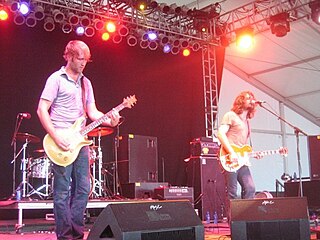
Minus the Bear was an American indie rock band formed in Seattle, Washington, in 2001, and comprising members of Botch, Kill Sadie, and Sharks Keep Moving. Their sound was described as "Pele-esque guitar-taps and electronics with sophisticated time signature composition."

Great Lake Swimmers is a Canadian folk rock band from Wainfleet, Ontario, and currently based in Toronto.
CFCF is the stage name of Canadian electronic musician/vocalist Michael "Mike" Silver. Based in Montreal, Silver took the name CFCF from the call sign of the city's CFCF-TV. Silver's work oftentimes involves themes of nostalgia.

Morning/Evening is the eighth album by British electronic musician Kieran Hebden, released under his alias Four Tet in 2015 by Hebden's own Text Records and via the online music store Bandcamp. As a child, Hebden had inherited a collection of Hindu devotional music from his late grandfather but did not listen to it until his maternal grandmother died during the making of his 2013 album, Beautiful Rewind. After sampling the voice of Indian playback singer Lata Mangeshkar, Hebden was inspired to make a record with a similar structure to Indian music, particularly the raga mode and decided to break the album into a "Morning Side" and an "Evening Side". Alongside the sampled vocals, Morning/Evening contains complex drum programming, electronic sounds and manipulated found sounds.
United Pursuit is an American contemporary worship music band founded in 2006 from Knoxville, Tennessee. They have released three live albums, EP in 2008, Radiance in 2009, and Simple Gospel in 2015. The 2015 album was their breakthrough release upon the Billboard charts.
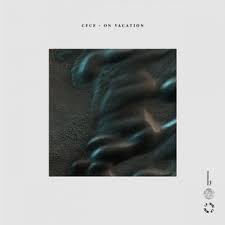
On Vacation is a mini-album by Canadian electronic musician Michael Silver, known by his stage name as CFCF, and the second record in Balearic beat music label International Feel's On Vacation mini-album series. On Vacation was initially planned to be a project of two extended plays titled Road Movie and House Music; this was before an International Feel A&R worker suggested to Silver he should make the project one whole album. International Feel first released vinyl versions of the LP in Europe on February 17, 2016 before releasing it in digital shops all around the world on February 19.

"The Colours of Life'" is a composition written and recorded in 2011 by Canadian electronic musician Michael Silver, known by his stage name as CFCF. The 40-minute, twelve-movement track was influenced by what Silver described as "some really cornball music," such as the works of singer Phil Collins and the Windham Hill label. The style Silver went for with "The Colours of Life" was "call waiting background music, just the most pleasant thing and kind of trying to push to the edges of tolerable cheese in some places, but also have it be totally sincere and not ironic, like actually purely pleasurable music."

Music for Objects is an extended play by Canadian electronic musician Michael Silver, known by his stage name as CFCF. The EP is a 24-minute set of eight compositions that are meant to showcase the emotion of everyday objects, a concept inspired by Wim Wenders' documentary film Notebook on Cities and Clothes (1989). Music for Objects has the same ambient feel as CFCF's previous EP Exercises (2012) but with a much more uplifting tone. Music for Objects was released in July 2013 in European territories by Dummy Records and in North America by Paper Bag Records, and garnered favorable reviews from professional reviewers upon its distribution. Some critics wrote it was enjoyable without knowing its object concept, while others praised how it represented the objects.
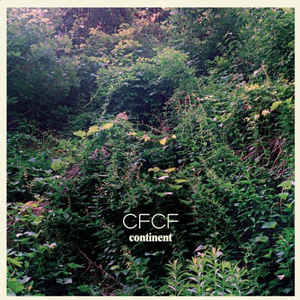
Continent is the debut studio album by Canadian electronic musician Michael Silver, known by his stage name as CFCF. It was released on October 27, 2009 by the label Paper Bag Records. Continent is a downtempo dance album that was described by one reviewer as "dance music that doesn't want you to dance." It includes elements from a variety of styles such as IDM, balearic, synthpop, rave, and disco and differs from later CFCF albums more focused on new age and ambient compositions. Continent features a cover of the song "Big Love" by Fleetwood Mac. The LP garnered very favorable reviews from professional music reviewers, praises going towards its compositions, arrangements and use of musical styles.

The River is an extended play written and produced from 2009 to 2010 by Canadian electronic musician Michael Silver, known by his stage name as CFCF. It was inspired by Werner Herzog's 1982 film Fitzcarraldo. Described by RVNG Intl.'s press release as a series of "lucid sound sequences from a lunatic mind," the experimental downtempo psychedelic new age EP was analyzed by music journalist Jonny Coleman as the story of a character who is stranded in a rural, tribal land. The River is a set of six original tracks by Silver with digital download versions of the record containing four remixes of songs from the EP by acts such as Jacques Renault, Coyote, and Games. The River was released by label RVNG Intl. on October 12, 2010, to generally positive reviews from critics, some reviewers calling its more modern-sounding cuts to be the best of the entire record.
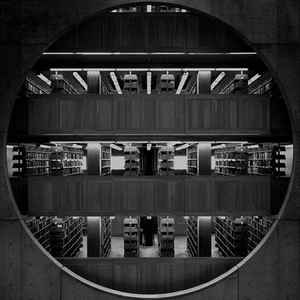
Exercises is the fifth extended play in the discography of Canadian musician Michael Silver, known by his stage name as CFCF. The extended play was inspired by brutalist architecture and several synthesizer-heavy modern classical and piano-only works that Silver listened to during the fall and winter of 2010–11, which were the "soundtrack" to how he felt "kind of uncertain” in those seasons. Its cover art by Ken Schwarz, Josh Clancy, and Travis Stearns shows one of the buildings the extended play was inspired by.

Outside is the second studio album of Canadian electronic musician Michael Silver, known by his stage name as CFCF. Silver began work on a second CFCF LP shortly after the release of his debut album Continent (2009) in order to increase his reputation of being more than just a "house DJ." The record has feelings of being tired and hoping to reach something, which was influenced by Silver's experience in traveling to and from places such as New York, Toronto, and Montreal. He would often look at other landscapes while he was bored during travels and became "immersed" in the fantasies caused by looking at them.

Cascades is a collaborative extended play between electronic musician Michael Silver, known by his stage name CFCF, and neoclassical pianist Jean-Michel Blais. The EP is a set of five post-minimalist ambient re-workings, the first four of them being of original tracks by Blais and CFCF and the final one being a rework of John Cage's "In A Landscape." Released by the label Arts & Crafts on March 15, 2017, Cascades received very positive opinions from professional music critics, a common praise being the "distinct blend of the artists’ digital styles," stated PopMatters.

Jean-Michel Blais is a composer and pianist from Quebec, Canada.
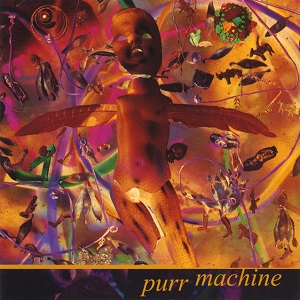
Ging Ging is the debut studio album by Purr Machine, released on January 13, 2000, by Re-Constriction Records.




















